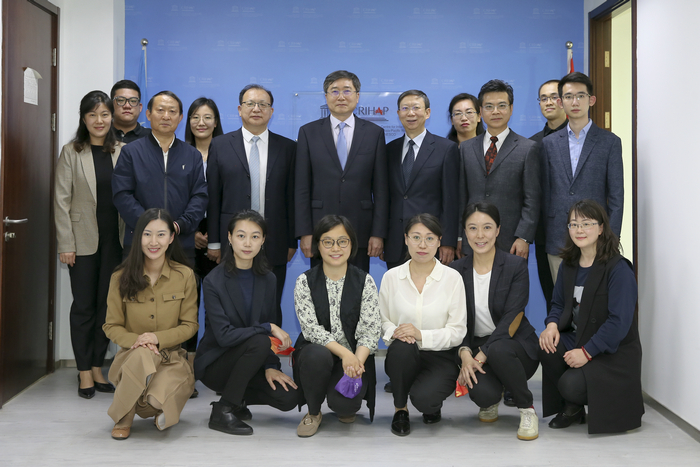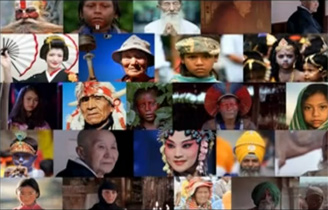CRIHAP's governing board holds 11th session
Zhang Xu spoke highly of what CRIHAP did in the past year. "In the face of the pandemic, CRIHAP took new and creative approaches to deliver its work and eventually managed to accomplish all tasks as planned," Zhang noted. "As a Category 2 center, CRIHAP acted pursuant to the UNESCO's rules and regulations and implemented its duties well, especially in international training."
Because of the many encouraging and remarkable results in CRIHAP's performance, the center has won recognition and high praise at the session from all relevant parties, including UNESCO and state members of the Asia-Pacific region.
Zhang also said the pandemic, which has yet to be brought under control globally, still poses a challenge to CRIHAP. He hopes CRIHAP gets prepared through contingency plans, establishes multi-layered mechanisms for international cooperation, continues to push forward its training programs, accomplishes its duty as one of the few UNESCO Category 2 centers in creative approaches and has positive results, making a new contribution to the implementation of UNESCO's capacity-building strategy and the building of a community with a shared future for mankind.
The Chinese government will cooperate more closely with UNESCO, keep supporting CRIHAP’s commitment to better implement its duty and play a more active role in promoting the convention in the Asia-Pacific region and beyond, Zhang added.
Members and observers of the board all agreed CRIHAP successfully held a large number of targeted and valuable activities of ICH capacity-building in the pandemic. CRIHAP has developed a very detailed training programme in accordance with UNESCO's priorities in ICH safeguarding, and used some innovative methods to organize targeted and valuable Capacity-building activities.
They expect CRIHAP to continue moving forward the implementation of UNESCO's capacity-building strategy and to make new contribution to the ICH safeguarding in the Asia-Pacific region.
Wang Chenyang said while the global fight against COVID-19 has become the new normal in 2021, CRIHAP has managed to carry out eight ICH safeguarding capacity-building workshops for international trainees, enhanced the ICH safeguarding and convention implementation capabilities of relevant countries and contributed to UNESCO’s global strategy of ICH safeguarding capacity-building.
Wang added he believes CRIHAP’s 2022-2026 development plan will lay a solid foundation for its work in the coming years.
Wang then gave an overview of China’s latest efforts to integrate ICH safeguarding into its “targeted poverty reduction” project and to include ICH safeguarding in its national education system. Wang said CRIHAP has already paid attention to these developments in previous training workshops. He expressed his hope CRIHAP continues contributing to these key issues through its international training workshops in the future.
Wang Fuzhou gave recognition to CRIHAP’s training workshops over the last year which focused on such topics as youth, capabilities and sustainability.
He said he hopes CRIHAP will make more progress in its training as devised in the medium-term plan (2022-2026). Wang then gave a briefing about the latest developments in the construction of a cultural heritage safeguarding system and in the disciplinary construction of ICH safeguarding in China.
He added he hopes CRIHAP keeps improving its training service, takes into consideration the above-mentioned subjects and delivers training courses that are always systemic, targeted and professional.
Himalchuli Gurung, a program specialist for culture from the UNESCO Beijing Office, called CRIHAP “a good partner” in her speech. She hopes to strengthen cooperation with CRIHAP in the future and suggested CRIHAP share with other countries its experiences in organizing effective ICH training workshops.
Sato Kuni, representative of board member Shimatani Hiroyuki, congratulated CRIHAP on its achievements in 2021. She said CRIHAP overcame all difficulties caused by the pandemic, carried out capacity-building activities on ICH safeguarding with an online-plus-offline training approach, achieved remarkable results and laid a solid foundation for its future training workshops.
Bamo Qubumo, vice-president of the China Folklore Society, said CRIHAP has accomplished all its tasks including ICH safeguarding capability building and the implementation of the 2003 convention by seeking innovation in its working mechanism. In her view, CRIHAP’s work report is “very impressive with adequate data, vivid cases, and solid facts”.
She spoke highly of CRIHAP’s workshop for China’s ICH safeguarding personnel at the grassroots level on ICH and sustainable development. She said the workshop was timely and effective and may serve as a good example for other state parties of the 2003 convention and for other UNESCO Category 2 centers.
Gao Bingzhong, a professor with the Institute of Advanced Studies in Humanities and Social Sciences and the director of Academic Committee of Beijing Normal University, congratulated CRIHAP on its remarkable achievements in 2021.
Gao said CRIHAP delivered a very impressive performance last year as it moved forward despite difficulties and limitations, took up challenges through innovation and scored positive results in the end.
Jisung Kim, newly appointed director-general of the International Information and Networking Centre for Intangible Cultural Heritage in the Asia-Pacific Region under the auspices of UNESCO from South Korea, spoke highly of CRIHAP’s international training workshops which were conducted in a creative and effective way.
Kim said CRIHAP has set a good example for other institutions in solving problems and achieving goals. He said CRIHAP’s training workshop on ICH and youth was meaningful and productive, adding he hoped it could become a long-term training course.
Some representatives attending the session made suggestions on CRIHAP’s future work. For example, Wang Chenyangsuggested CRIHAP pay more attention to collecting, researching, and processing cases of implementing the 2003 convention in party states, organize ICH facilitators to carry out long-term monitoring of relevant information and integrate the results of systematic analysis and research of these cases into CRIHAP’s future training courses, thus enriching their contents and extending their themes.
Gao suggested CRIHAP focus on cultivating a younger generation of scholars and building a networking platform for them when planning its youth-themed ICH safeguarding training workshops to ensure there will always be new emerging forces in reserve for the sustainable development of ICH research and safeguarding.
The International Research Centre for Intangible Cultural Heritage in the Asia-Pacific Region under the auspices of UNESCO from Japan expected to share with CRIHAP its research information with regard to ICH safeguarding and disaster mitigation in small island developing states in the Pacific region, thus contributing to ICH safeguarding and sustainable development there.
The International Information and Networking Centre for Intangible Cultural Heritage in the Asia-Pacific Region under the auspices of UNESCO from South Korea suggested CRIHAP continues keeping contact with the Asia-Pacific Higher Education Network for Safeguarding Intangible Cultural Heritage and carrying out long-term cooperation in projects such as ICH and Youth and ICH and Education.
The CRIHAP Governing Board is the center’s management and guidance organization, consisting of representatives from the Chinese government, the UNESCO Director-General, the China national commission for UNESCO, governments of UNESCO’s state parties, internationally renowned cultural experts and scholars from the Chinese National Academy of Arts, and representatives from other academic institutions, intergovernmental and nongovernmental organizations.

Address: 81, Laiguangying West Road, Chaoyang District, Beijing, China
Zip Code: 100021
Tel: 86-10-64966526
Fax: 86-10-64969281
E-mail: administration@crihap.cn
NEWSLETTER
Leave us your e-mail address, we'll let you know about current events.


